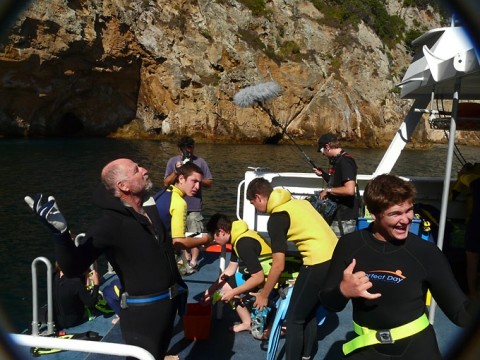A Blue Education
Imagine a place where kids could wormhole back in time, bob on the oceans currents and stare down at the vast schools of butterfish, mao mao, parrotfish and eagle rays.
That’s the kind of experiential study that veteran scuba-diver, aquanaut and author Wade Doak would like to see more of in New Zealand.
Deprived of fish-filled seas, our children are growing up with seas that are crystal clear and blue, but are on many levels lifeless
A visit to a wet library, or marine reserve opens their eyes to the bristling fish-life that is typically seen when we just leave our seas alone.
By opening up 2/3 of the planet to our youngsters we’re helping to recruit the next generation of marine scientists, conservationists and, what Doak calls ‘homo aquaticus’.
The concept is simple: have a marine reserve within 50kms of each school, so kids can take day trips to fish-filled seas.
One such school up North – Whangarei’s Kamo High School- took this mission on board in 1990.
Spurred on by their scuba-diving teacher, students initiated an application for three marine reserves (a full ecological sequence) as part of their geography assignment.
Over 900 students took part in the application and 16 years later in 2006 they received a slightly slimmed down version of their original plan: two marine reserves covering mangrove, tidal areas and unique rocky reefs.
The kids had to do it all: underwater surveys, polls, presentations for various stakeholders and iwi.
Since then one of the students spearheading the project – ex- head prefect Samara Nicholas – has taken up a job as the director of Experiencing Marine Reserves.
And since this project began over 10,000 children have been taken to places where the fish are in full-time employment as entertainers: Poor Knights, Goat Island, Kapiti, Te Tapuwae O Rongokako (Gisborne), Able Tasman and Wellington’s South Coast
The kids aged between 10-13 years are unleashed on the marine reserves to swim, snorkel and sightsee under the supervision of EMR trained co-ordinators.
Marine experts such as Dr Roger Grace and Wade Doak are invited on the trips to provide answers to curly questions and talk about the value of marine reserves.
Since its inception in 2002, it has grown from one co-ordinator working with three schools, to three co-ordinators covering over 30 schools from Whangarei to Nelson.
In the near future, Nicholas hopes to rollout a toolkit for those schools that want a marine reserve on their doorstep – which hopefully will spawn thousands of pint-sized marine-reserve lobbyists!
To find out more about marine reserves (or lack of) in your area see here
http://www.forestandbird.org.nz/what-we-do/campaigns/we-love-marine-reserves

